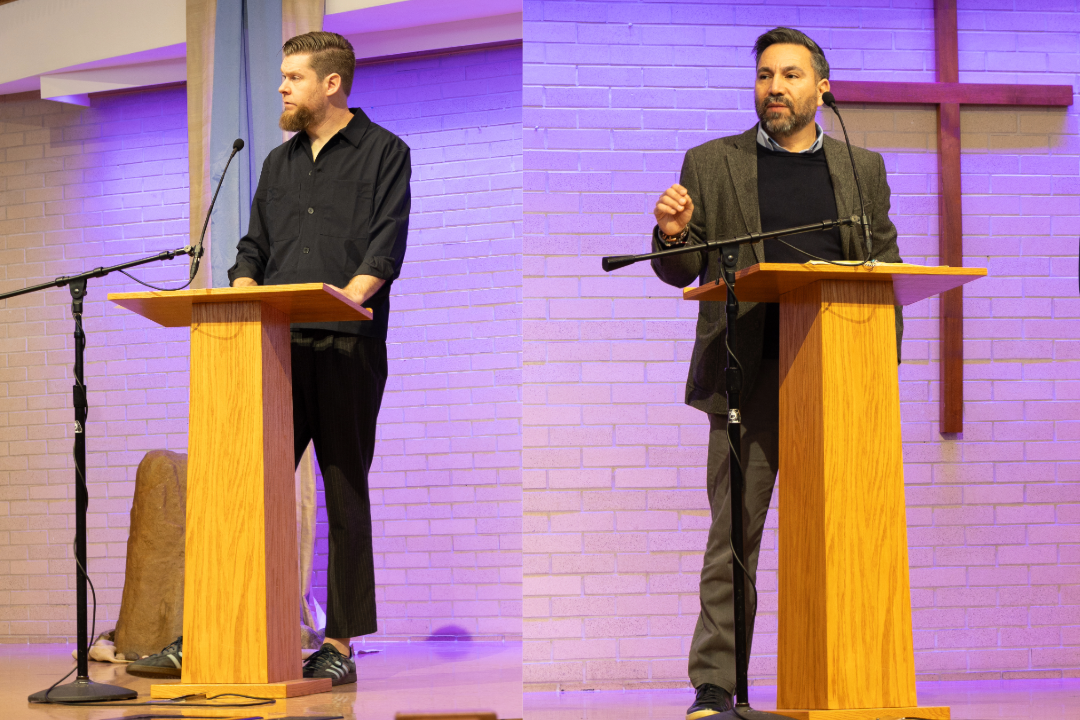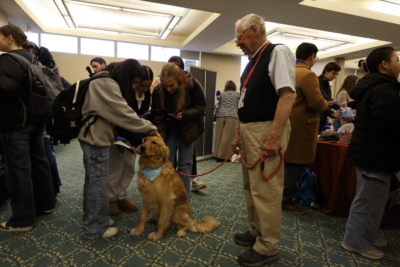The theme of this week’s Goshen College convocation was “US Immigration.” The convo was hosted by Gilberto Pérez, vice president of Student Life, Philipp Gollner, professor of U.S. history, and Saulo Padilla, a Mennonite Central Committee migration education coordinator. They shared their stories of immigration to the United States.
Gollner, who grew up in Austria, took the stand first. He started by talking about his experiences with immigration while going through Chicago O’Hare airport this year. Gollner explained that he has been through immigration twice this year and how in April, he was called into secondary questioning with his family for the first time since receiving his green card.“So, you walk back into this room with a lot of other very anxious people. We were in there for about 20 to 25 minutes until they said we could go again,” Gollner said, highlighting the fear that many people face when they are questioned about their status as a citizen.
The second time Gollner went through immigration this year, was when he returned to the US after being in Bosnia and Herzegovina. When he was questioned about the purpose for his visit to Bosnia, he explained that it was for a “soccer connection.” This revealed to Gollner that despite the heat of the situation, the officer was actually from Bosnia and they had so much in common. This showed the audience that despite the fact that these officers have a job to do, they are still human.
The main connection that Gollner made during his speech was that there is a “lot of connection between immigration and identity in America.” He said, “There are two images that relate to food that have to do with immigration. One is that ‘America is a melting pot’ and the second is that ‘America is not a melting pot, but a salad bowl.’”
“The idea here is an American identity from the beginning isn’t fixed,” said Gollner, highlighting how this country has been filled with people from all backgrounds, from “early colonies, to Dutch settlers and German farmers.”
Padilla then took to the stand. He started by asking the question, “What kind of world would you like to be in 25 years? I am 55 years old, in 25 years, some of you will be in your 40s, maybe 50s. What kind of world would you like?”
Padilla also commented on the attitude that some people have towards immigrants. “Many people say, ‘if you have your documents then I will accept you.’ But I will say that is a lie. That is not true. Especially when you’ve seen it today in this administration of the United States, where citizenship and government really haven’t mattered much,” he said.
Throughout his speech, Padilla described his work with the MCC. He said that they go to the border of Mexico and Guatemala in order to “educate people to people’s connection.” He made the connection between his work at the border and his faith journey. “I truly believe that this is Jesus’ way of learning. I believe that Jesus did a three-year learning tour of taking people into crossing borders, crossing into spaces and connecting with others.”
Padilla commented on how students can make positive changes in society in the immediate future. “I think that engaging with each other, not just being stuck in the narratives that are on our phone screens, but by connecting with each other in a human way.”
Currently, 11% of students at GC are international, with 32 countries being represented on campus. Gollner commented on how the issue of immigration is often overlooked in the Midwest. “I think the issue is more immediate than it is in many other places. Often you get attention to questions of the southern border, so immigration from Central America, at the expense of what else is going on.”
Gollner also believes that these conversations are important for a tight-knit community like GC’s. “I think chapels like this help us connect those stories a little bit and see the whole tapestry, not just as a policy issues or as a headline grabber that you are supposed to be an activist about, but as something that really defines a big chunk of who we are as a community,” he said.
Pérez commended the International Student Club for the work that they do in helping international students feel welcome at GC. Pérez believes that the ISC “is a bridge between other students who may not know what it’s like to live in Ireland, or what it’s like to live in Ecuador, or anywhere in the world.”
“That’s what it’s about in terms of being in that mosaic of us as a people where we come with different cultures, different traditions and different policies and I think that the ISC is doing a great job in helping us to be a strong Goshen College community,” Pérez said.



